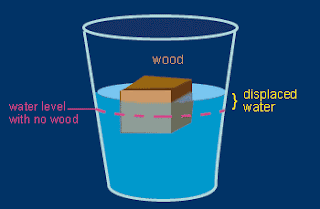Volume: the amount of space an object takes up.
Weight: (on Earth) a measure of the force of gravity between Earth and an object.
Density: a measure of how tightly packed matter is; the a mount of mass contained in a given volume.
Buoyancy: the upward push on an object by the liquid (or gas) the object is placed in.
Conduct: allow heat or electricity to flow through readily.
Insulate: not allow heat or electricity to flow through readily.
Element: a basic building block of matter; a pure substance that cannot be broken down into anything simpler.
Compound: a chemical combination of two or more elements into a single substance.
Atom: the smalest unit of an element that still has the properties of the element.
Proton: a particle with a positive charge in the nucleus of an atom.
Neutron: an uncharged particle in the nucleus of an atom.
Electron: a particle with with a negative charge moving around the nucleus of an atom.















No hay comentarios:
Publicar un comentario